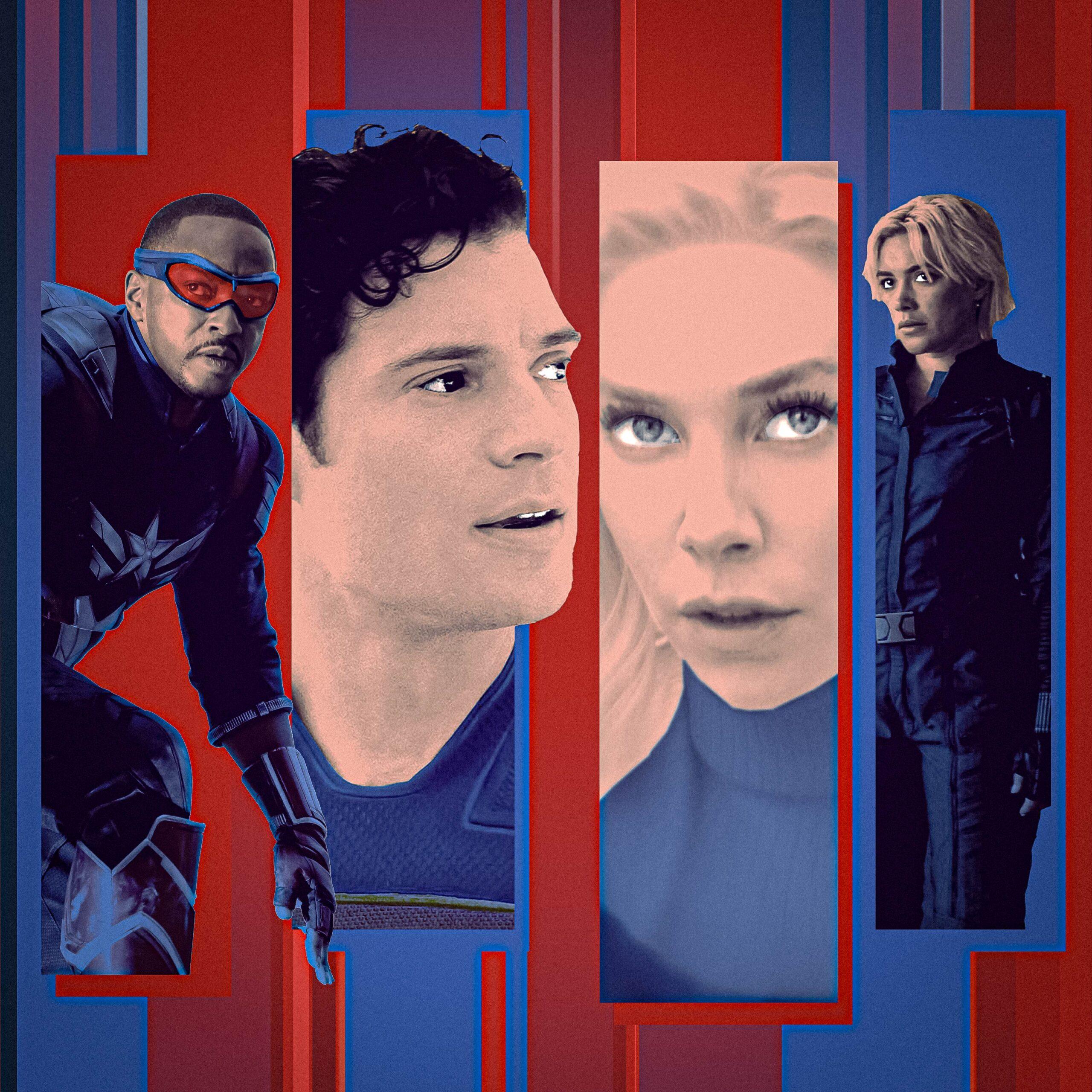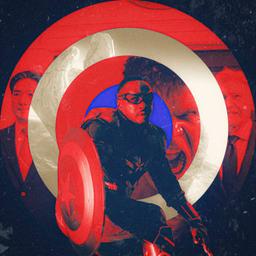
Last year was a quiet reset for superhero movies. Sony’s live-action Spider-Verse met its bitter end in December after Kraven the Hunter became its final flop. DC Studios didn’t release any movies in theaters, but that didn’t stop Warner Bros. from delivering Joker: Folie à Deux to the unwelcoming masses. The film was universally panned and cost the company hundreds of millions of dollars. Even Marvel Studios released just one feature, Deadpool & Wolverine, making 2024’s theatrical slate the studio’s lightest since 2012, when The Avengers premiered as its lone film of the year.
Deadpool & Wolverine challenged—on a financial level, at least—the growing belief that superhero fatigue had set in. The movie was a massive hit for Marvel at the box office, taking in more than $1.3 billion worldwide to become the highest-grossing R-rated film ever made. But the film offered very little from a creative standpoint, sustaining itself on Deadpool’s familiar brand of crude humor, star-studded cameos to send off 20th Century Fox’s Marvel universe, and the sheer spectacle of Hugh Jackman wearing Wolverine’s iconic yellow-and-blue costume for the first time. While that nostalgia-fueled combination worked wonders at the box office, it’s not a business model that can be easily replicated—and it shouldn’t be. Not that that’s stopping Marvel from trying.
This year could be a crucial turning point for superhero movies, as Marvel Studios and DC Studios gear up for their most important release lineups in quite some time. Marvel is tripling its theatrical output in 2025: Captain America: Brave New World premiered this week, Thunderbolts* arrives in early May, and Fantastic Four: First Steps will follow in late July. And while DC has just one film coming out this year, it’s a big one: Superman, scheduled for early July, will kick off the new DC Universe under James Gunn and Peter Safran.
It may be a little overdramatic to say that 2025 is a make-or-break year for superhero movies. There’s certainly truth to the notion that the theatergoing public has been suffering from superhero fatigue, but that’s nothing new. Deadpool & Wolverine showed that superhero IP hasn’t entirely lost its box office superpowers, and Marvel and DC will push forward with their ambitious, interconnected stories across TV and film for the foreseeable future, no matter how this year’s high-profile projects are received. (2025 is set to be even busier on the small screen: Marvel has six TV series on the calendar, including three live-action shows, and DC has five, one of them live-action.)
Nonetheless, these four films represent an important test for both studios—and their competitors—to gauge where their audiences’ appetites stand and whether it’s time for their parent companies to hit the panic button on their prospective plans. And with Captain America: Brave New World batting leadoff, the year is off to a bleak beginning.
Directed by Julius Onah, Brave New World is another Marvel misfire on just about every level. It’s a bad stand-alone movie that doesn’t even generate any excitement for the future MCU stories that it so shamelessly works to set up. Brave New World is as much a sequel to 2008’s The Incredible Hulk as it is to The Falcon and the Winter Soldier, which is a baffling narrative decision in its own right. In light of its other connections to Eternals, along with its responsibility to set up Avengers: Doomsday and an untitled X-Men movie, Brave New World feels more like a rickety bridge built to connect the past, present, and future of the MCU than an earnest attempt to tell a story centered on Anthony Mackie’s Captain America.
Marvel Studios may have made lesser films like Brave New World before, but what’s so frustrating about this one is that it falters in such familiar ways. Brave New World has a messy CGI spectacle at the heart of its third act, a forgettable villain in Samuel Sterns, and too much built-in backstory from previous MCU projects that the filmmakers feel obligated to spell out to the audience in clumsy terms. The Captain America sequel reportedly went through a very challenging production process that involved lengthy reshoots after it tested poorly with audiences last year, major cuts, and the late addition of a supporting supervillain in Giancarlo Esposito’s Sidewinder. (A technical crew member who worked on the film told Vulture: “I think everyone on the crew knew this [was] probably not going to be a good film.”)
Brave New World currently sports a low critics rating of 53 percent on Rotten Tomatoes and a 43 on Metacritic, the lowest score for an MCU film. It’s projected to earn $95 million at the domestic box office over Presidents’ Day weekend, which would place it somewhere in the middle of the pack for openings during Marvel’s Multiverse Saga. While that figure would easily qualify as the biggest debut of the young year, poor reviews and a number of controversies surrounding the film could lead to a Quantumania-sized decline in ticket sales in subsequent weeks.
Thunderbolts* generated some hype with a TV spot during the Super Bowl, but Brave New World doesn’t inspire confidence that Marvel’s next movie will be much better. The team-up film has a star-studded cast, including Sebastian Stan in his return as future congressman (?) Bucky Barnes, but most of the Thunderbolts are lesser-known characters who were introduced after the Infinity Saga ended.
More important than either Brave New World or Thunderbolts* is the pair of blockbusters coming out this July: Fantastic Four: First Steps and Superman.
Directed by Matt Shakman (WandaVision), the Fantastic Four reboot will mark the studio’s first foray into Phase 6—the final chapter of the Multiverse Saga, the rocky cinematic era that followed the unprecedented success of the Infinity Saga. Set in a different time period and a different universe than the other movies in the MCU, First Steps has the chance to be something of a soft reboot, especially considering its assignment to tee up the final phase of the Multiverse Saga. The first teaser flashes a distinct visual style—which is exceedingly rare for Marvel Studios—and a clear motivation to distinguish itself from other MCU films of the recent past. That alone is more than one could say about Brave New World.
However, it’s no secret that Marvel’s First Family has been difficult to adapt on the big screen. 20th Century Fox tried three times, and although 2005’s Fantastic Four was a modest box office success for its time ($334 million worldwide), its 2007 sequel—Fantastic Four: Rise of the Silver Surfer—made less money ($302 million). The 2015 reboot did even worse, earning just $167.9 million globally against a budget of $120 million. Perhaps needless to say, none of these movies were particularly good, either.
As beloved as these characters are, and as rich as their comics history is, the Fantastic Four isn’t the easiest crew to visualize in live-action form. First Steps is also doubling down on the use of the planet-devouring Galactus (Ralph Ineson) as its villain after Rise of the Silver Surfer portrayed him as a cosmic cloud of dust rather than trying to depict him as the purple-clad titan he is in the comics. Kevin Feige is taking plenty of creative risks in the biggest launch of a new MCU franchise in a long time. It’s also the studio’s first attempt to fully reboot one of its acquisitions from the Disney-Fox deal in 2019, after it largely recycled the cast and creative team behind the first two Deadpool movies to create last summer’s Deadpool & Wolverine. If First Steps ends up being another flop and creative disappointment, closing out the Multiverse Saga and building momentum for whatever comes next would be a challenge.
Superman is a significant release for DC Studios for similar reasons, but the stakes surrounding its reception are much higher. Although DC has had occasional big-screen successes in recent years, such as 2022’s The Batman, the studio has struggled to find any semblance of consistency since the last time a stand-alone Superman movie (Man of Steel) was released, at the start of the Snyderverse era in 2013. Enter Gunn and Safran, who were announced as the cochairs and co-CEOs of the newly formed DC Studios in October 2022. The duo has been rebuilding the DC Universe since then, with no other choice but to rely on the measly scraps of the DCEU—and a single live-action Batman movie—as their theater releases in the meantime. And the likes of Black Adam and The Flash haven’t exactly helped restore the DC brand’s good name.
Superman, written and directed by Gunn himself, is a huge opportunity to reboot the DCU in spectacular fashion. Based on the look of the trailer (and its strong viewership numbers), a promising cast, and Gunn’s track record between the Guardians of the Galaxy trilogy and The Suicide Squad, the highly anticipated film is shaping up to do just that. But superhero movies aren’t the surefire box office bets that they used to be, and Superman IP is far from invincible. Despite Henry Cavill’s popularity in the title role, 2016’s Batman v Superman: Dawn of Justice fell flat with critics and underperformed at the box office at a time when Marvel Studios was practically printing money with the majority of its blockbusters. (And the less said about Justice League, the better.) If Superman somehow undershoots the studio’s lofty expectations, Gunn and Safran will be in trouble just as their eight- to 10-year plan gets underway.
In recent years, Marvel Studios, in particular, has gotten greedy with how much it floods each calendar year with superhero movies and TV shows that prioritize the promotion of the next product over self-contained storytelling. Disney CEO Bob Iger has acknowledged this strategy as a leading factor in the superhero fatigue that is plaguing the company’s consumers and has said that he’s been “working hard with the studio to reduce output and focus more on quality.” But it’s hard to believe him when movies like Brave New World exist. Crowded release schedules across film and TV continue to raise questions about whether any major purveyor of on-screen superhero products will ever be able to learn from their mistakes. We won’t get a definitive answer in 2025, but this year’s momentous releases will give us a good read on how much life is left in the superhero genre, both creatively and financially.





